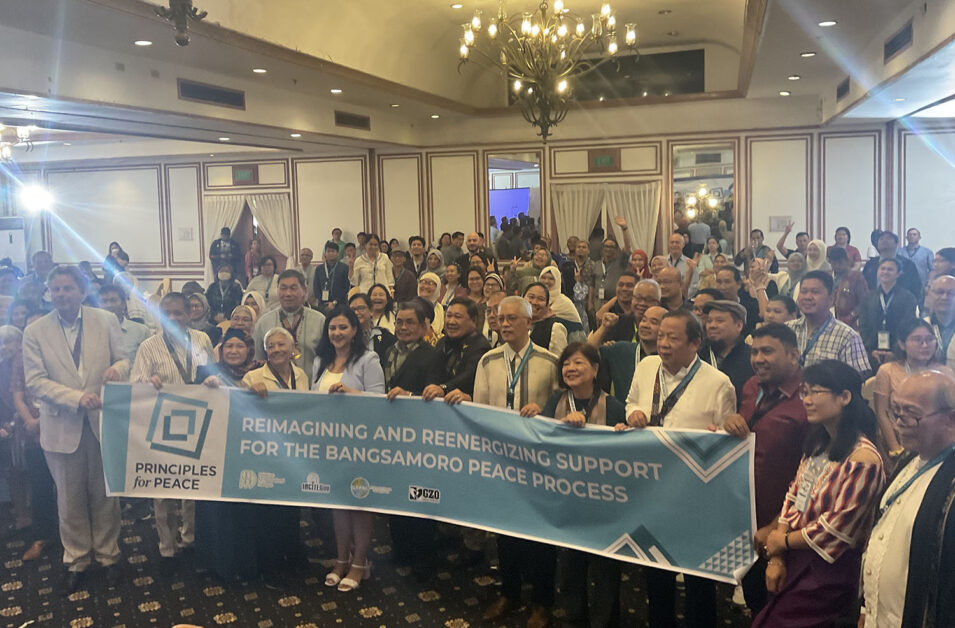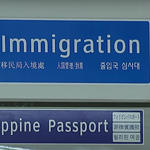DAVAO CITY (MindaNews / 11 July) – Peace advocates launched here Tuesday the “Principles for Peace” (P4P), an initiative that seeks to set a “new mechanism, standards and metrics to support and sustain efforts for a long-lasting peace in Mindanao.”
During the “P4P Southeast Asia Regional Launch” at the Waterfront Insular Hotel Davao, Hiba Qasas, executive director of the Principles for Peace Foundation, acknowledged that the region, including Mindanao, is a home to some of the most successful peace processes where other conflict-affected areas of the world can learn from.
“As you can see, these principles are more than a set of standards or common framework. They are meant to be a platform of unity, of vision and of common purpose,” she said.
She added that the principles would not only serve as a “common ground to break barriers” so that the stakeholders could act together, converge and sustain peace, but also provide some opportunity to catalyze shared understanding and language that transcends political and social divides.
The P4P includes dignity, solidarity, humility, embracing legitimacy, accountable security, integrated & hybrid solutions, adopting subsidiarity and promoting pluralism.
According to a briefer, dignity is both the aim and the means of peacemaking and embodies mutual respect and fair and equal treatment of all parties and individuals; solidarity is based on a fact that the world is fundamentally interconnected and interdependent; and humility is being emphasized as peacemakers should strive to be empathic and respect the efforts and perspectives of others.
It added that embracing long-term legitimacy of peace processes is a primary objective for successful and sustainable peace; accountable people-centered security and justice provision is required to end hostilities and reduce risk of the cyclical return of violence; and, enhancing the local legitimacy of and support for peacemaking initiatives, including horizontal integration of activities and embedding solutions in local norms, traditions and institutions.
It also enshrined subsidiarity as a principle, which means peace process should be “local as possible and global as necessary,” and promotion of pluralism by ensuring fair and equal participation in public life and providing equitable access to institutions and services across communal, political, social, economic and gender divides.
Qasas expressed hopes the eight principles would provide the communities a platform for dialogue and participation that can put different sectors of society together around the common vision in order to move the process to work.
She said the principles could serve as a “useful tool and a lens for decision-making in governance.”
Bert Koenders, chair of the Principles for Peace Foundation, said the principles can catalyze better decision-making and guide joint actions in achieving lasting peace, but emphasized that they must be put in practice.
“We are here because we want a new approach to peace… It is from this premise that the belief that there must be a better way forward that the Principles for Peace was created, as a worldwide initiative supported by evidence and research,” he said.
Mohagher Iqbal, chair of the Moro Islamic Liberation Front (MILF) Peace Implementing Panel, said the “principles provide a framework for building a just and lasting peace.
“No one can argue against the importance of these values. These values, however, are frames and ideals, and experience shows that it is more challenging to uphold them perfectly in practice because of competing values and priorities,” he said.
Iqbal, who is also the Education Minister in Bangsamoro Autonomous Region in Muslim Mindanao, said the values and principles also require humility, compromise and willingness to listen to the needs of others.
“There will always be challenges to peacemaking and it is essential to remember that peace is a journey and not a destination,” he said.
Iqbal said he resonated with the principle of dignity because “the revolutionary struggle is in response to its denial of our dignity by Spain, the Americans and Filipinos.”
“This denial of dignity has been ongoing for hundreds of years and continues today. Our revolutionary struggle is a claim to our birth right to dignity to be treated as a people who are valuable, important and an equal to the Filipino,” he said.

Gus Miclat, executive director of the Mindanao-based Initiatives for International Dialogue, told reporters the peace principles provide and offer “a mechanism and a new framework in regenerating the support that the Bangsamoro peace process had.”
He explained that the new framework would serve as a diagnostic tool to measure the progress of the Bangsamoro peace process.
“We are offering this new framework called the ‘Principles for Peace’ as a new metric that will determine and diagnose what has been happening because all peace processes don’t end with the peace agreement,” he said.
In a briefer, the P4P is a “result of an extensive two-year global consultation process that gathered inputs, including in a Southeast Asia meeting in Manila last October.”
“The P4P is a follow-up mechanism for an initiative that hopes to celebrate a paradigm shift in the field and create an independent feedback loop to inform decision-making that is inspired by and can accompany peace-building practices in the region,” it said.
It added that the “Peacemaking Covenant” outlines four shifts in approach to peacemaking as well as eight core Principles for Peace that aim “to foster the inclusive and flexible discussions needed to chart a new path towards sustainable, legitimate and lasting peace.” (Antonio L. Colina IV / MindaNews)



